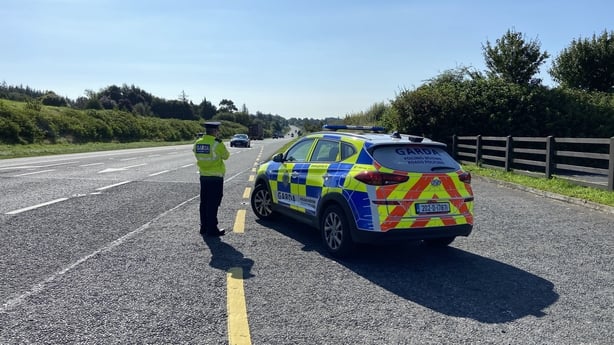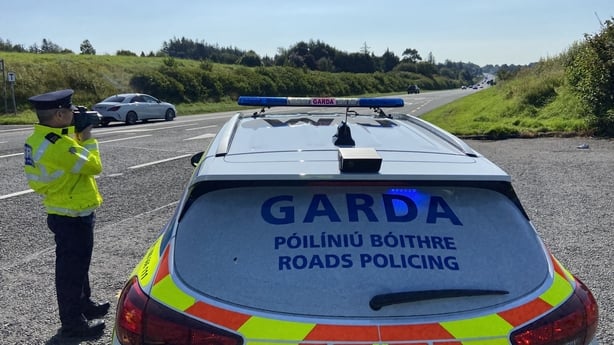There is to be a 20% increase in the deployment of speed camera vans as part of efforts to tackle the rise in road deaths.
The Minister for Justice and the Garda Commissioner have agreed to allocate an additional €1.2 million in funding to increase the use of GoSafe vans.
The move will allow for 1,500 extra hours of the mobile speed checks in safety camera zones around the country.
Helen McEntee said that "the sole intention is to catch people speeding but also to try and change and to amend people's behaviours" on the roads.
The Minister said the decision has been taken amid what she described as "a worrying trend, an increase in road deaths in the last few months."
"We want to make sure that that trend starts to change in the opposite direction," she added.
The Minister for Justice is to meet with the Minister of State at the Department of Transport Jack Chambers tomorrow to discuss the increase in road fatalities.
Minister McEntee said the focus of the meeting is to see what more they can do, working with other stakeholders including representatives of An Garda Síochána and the Road Safety Authority "to try and reverse what are very worrying trends of road deaths in the last weeks and few months."
Since the start of 'Slow Down' day, which began at 7am this morning, 310 motorists have been detected speeding, including one travelling at 155km/h in a 120km/h zone on the M6 near the Tyrellsspass junction.
GoSafe checked the speed of 142,796 vehicles since 7am.
It is already higher than the last 'Slow Down Day' in April, when 211 motorists were detected speeding over a 24-hour period in which 140,720 checks were carried out.

We need your consent to load this rte-player contentWe use rte-player to manage extra content that can set cookies on your device and collect data about your activity. Please review their details and accept them to load the content.Manage Preferences
Gardaí are carrying out a national speed enforcement operation for the next 24 hours, amid what they said is an "alarming increase" in road deaths.
In Co Monaghan, one motorist was detected driving at 121km/h in an 80km/h zone on the N2 at Drumcaw.
In Co Wicklow, a motorist was detected travelling at 134km/h in a 100km/h zone on the N11 at Timmore, Newcastle, while in Co Kerry another was clocked at 130km/h in a 100km/h zone on the N21 at Dooneen, Castleisland.
The operation is supported by the Road Safety Authority and coincides with the full return of all schools and the related increase in road users.
Gardaí said with an "alarming increase" in road deaths this year, 'Slow Down' day has taken on "increased urgency and relevance".
It consists of high visibility speed enforcement at selected Safety Camera Zones and other locations across the country.
So far this year there have been 127 deaths on Irish roads, which is 23 more than the same period in 2022 and 38 more than the same time in 2019.
Gardaí say that people under the age of 25 accounted for a third of all deaths on roads so far this year.
Last month, six people aged between three and 24, lost their lives in road crashes in a five day period.
Today's operation comes amid moves that could see motorists who commit more than one offence face increased penalty points, under a plan that will soon go to Government.
Minister of State Jack Chambers is set to change the current system where penalty points are only applied to the more serious offence.
The change would mean that motorists committing multiple offences would get penalty points for each breach of the law.
🔴In the first 5 hours of National Slow Down Day, GoSafe checked the speed of 37,916 vehicles
— Garda Info (@gardainfo) September 4, 2023
🔴127 vehicles were detected for speeding
Some speeds detected include:
- 139km/h in a 120km/h Zone
- 137km/h in a 120km/h Zone
- 146km/h in a 120km/h Zone#SaferRoads pic.twitter.com/TbXRpE11eg
Assistant Garda Commissioner Roads Policing Paula Hilman said 'Slow Down Day' was part of the back-to-school road safety campaign and in light of the recent road deaths, it is even more relevant.
Speaking on RTÉ’s Morning Ireland, she said: "We are always conscious that when we talk about those numbers, that communities, families are impacted by devastation, there's a face, there's a heart, there's a personality, an individual, behind every single one of these road deaths."
Ms Hilman said the vast majority of people killed in road crashes aged under 25 were passengers in cars.
She said: "We know that if we slow down, if everyone slows down and plays their part, we can reduce death on our roads, the World Health Organization estimates that a 5%, a small 5% reduction in speed, could result in a 30% reduction in fatal collisions."
In relation to changes to penalty points for offenders, Ms Hilman said that anything that contributes to safety on roads is to be welcomed.

She added: "The legislation, obviously, there's been consultation on that and that was part of the work of the Government road safety strategy and I think there's a collective effort that needs to be undertaken here to reduce the trend that we're seeing."
Chief executive of the Royal Irish Automobile Club Conor Faughnan called for more garda enforcement on roads.
Speaking to the same programme, he said: "We simply haven't been able to deliver the level of policing on the roads that’s required."
Mr Faughnan said he did not object to Mr Chambers' penalty points proposal, but said he did not think it was strategic.
He said: "Enforcement really is the key, every time we have a crisis in road safety, every time the numbers worsen, the minister of the day thinks up a new law or brainstorms up a new law or tougher punishment.
"It's not really that strategic or worth that much to us unless it's backed by enforcement".







